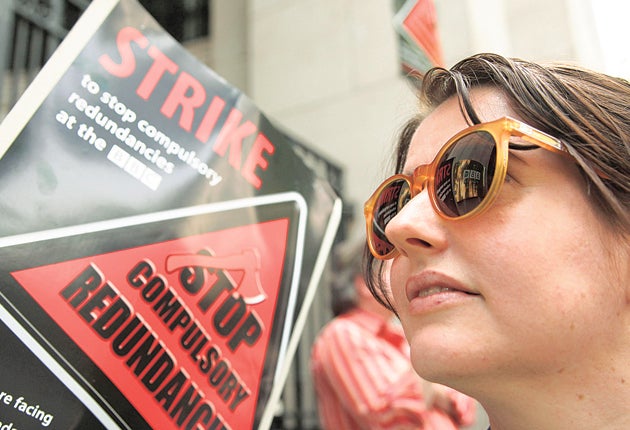The BBC has refused to rule out compulsory redundancies in the face of "significant" government cuts, despite a second strike by thousands of the corporation's journalists yesterday protesting over job losses.
Radio 4's flagship Today programme began an hour late in the wake of the strike which began at midnight. Nicky Campbell's 5Live Breakfast Show was presented instead by Ian Payne, and Newsnight was replaced with an episode of Have I Got News For You.
Members of the National Union of Journalists (NUJ) took industrial action across the UK, disrupting radio and TV programmes, with picket lines forming outside the BBC TV Centre in West London, Bush House in Central London and other BBC offices and broadcasting centres in Belfast, Glasgow and Manchester.
The corporation's NUJ members are due to follow up the strike by starting a "work to rule" today, in which they will refuse to do more than the bare minimum outlined in their contracts, including a ban on overtime, which the union said would affect BBC programmes in the run up to a meeting between the two sides on 11 August. Broadcasting bosses are believed to be more concerned about the potential impact of this action than the one-day strike.
The NUJ's general secretary, Michelle Stanistreet, told strikers outside Bush House in London: "We have had messages of support from other unions and members of the public who see that quality journalism is under attack." She said journalists were angered at a "change in approach" by the BBC to job cuts, with a number of compulsory redundancies already made and more expected.
Lucy Adams, the BBC's director of business operations, said in a message to staff that six out of seven employees were working normally and only "limited" changes to programmes had been made. "We will continue to speak to the NUJ daily in an attempt to resolve the ongoing issues. However it is simply not realistic for us to agree to a policy of no compulsory redundancies when we face such significant cuts to the central government grants that fund BBC Monitoring and the World Service.
"We will also carry on working to redeploy affected staff wherever possible. We have so far managed to redeploy 30 per cent of staff at risk of compulsory redundancy in BBC Monitoring and 27 per cent in the World Service. Nevertheless, we are clear we cannot create new jobs artificially nor can we give preferential treatment to NUJ members."
As well as being unable to agree to a bar on compulsory redundancies, she said management was "unable to agree to NUJ members who are facing redundancy being treated differently to other BBC staff". Ms Adams apologised to BBC viewers for the disruption to programming and thanked staff who had not gone on strike.
Ms Stanistreet said later: "BBC management seems to live in a fantasy world where it believes it can ignore the rights of staff and pretend that a serious industrial dispute simply isn't happening." She labelled as "demented" the notion that the strike was having no effect. In a separate dispute over rotas, NUJ members working for the BBC's Arabic service were on the third day of a six-day strike.
Subscribe to Independent Premium to bookmark this article
Want to bookmark your favourite articles and stories to read or reference later? Start your Independent Premium subscription today.


Join our commenting forum
Join thought-provoking conversations, follow other Independent readers and see their replies